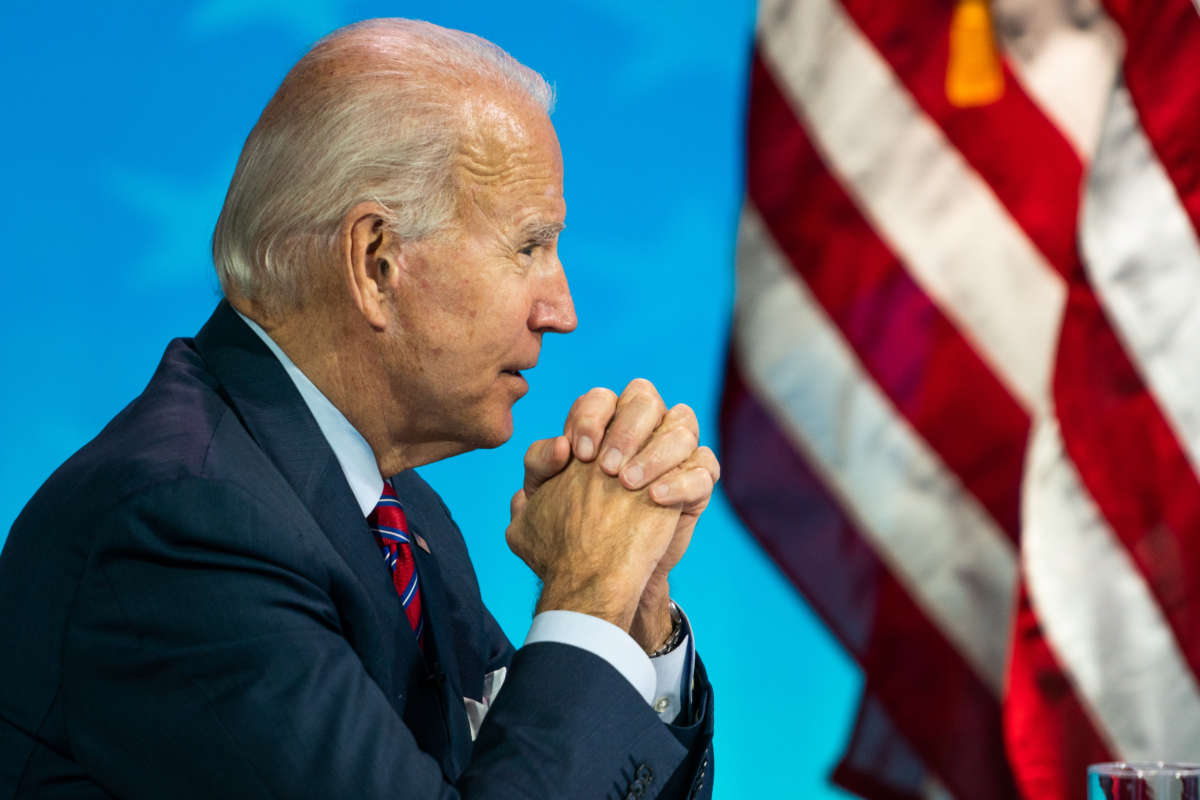The Biden campaign won on a slogan to “build back better.” But when it comes to tackling the climate crisis, the next administration seems to think “better” simply means hitting rewind. The world needs more than an Obama era reboot to be saved from climate chaos.
So far, a bevy of the leading contenders for key climate and energy nominees are holdovers from the Obama administration. The fact that former Secretary of State John Kerry has already been tapped for a key international post — the newly created role of special presidential envoy for climate — gave some hope that the climate crisis will, at the very least, be granted serious attention. But Kerry has been an apologist for fracking and a promoter of false climate solutions like market-based carbon-trading schemes. The times demand aggressive action, and there are serious doubts among climate activists that these leaders are the ones to deliver it.
Ernest Moniz, who served as Obama’s energy secretary in his second term and is reportedly being considered for the same position now, has drawn the most serious pushback. While the Obama administration was nurturing the disastrous oil and gas fracking “boom,” Moniz gave the policy a veneer of scientific credibility: His MIT Energy Initiative produced an influential 2010 study touting fracking as a “bridge” to clean energy, while downplaying the substantial environmental and climate impacts of the extreme fossil fuel extraction method.
That tragically misguided analysis informed Obama’s “all of the above” policy approach, which prioritized expanding dirty fossil fuel production while giving lip service to building out renewable capacity. The fracking boom polluted frontline communities and fouled drinking water, and greenhouse gas emissions continued to mount. And at the same time, the Obama administration — with Kerry at the helm of the State Department — viewed exporting fracked gas from the United States as a powerful foreign policy tool that would undercut adversaries, strikingly similar to Trump’s “freedom gas” campaign a few years later.
When he exited government in 2017, Moniz went back to working directly with corporations, at his own strategic energy venture called EJM Associates — which has ties with fossil fuel interests — and at the giant oil and gas utility Southern Company, while also founding an industry-friendly think tank called the Energy Futures Initiative. Moniz’s public role has mostly been about thwarting ambitious policies; while an international climate movement propelled the Green New Deal to the forefront, Moniz was peddling a “Green Real Deal” in a meager effort to undercut bold action. While the plan acknowledges that climate change is real, it sees an essential role for natural gas and does not set emission reduction targets.
Several other possible Biden appointments have followed a similar career path. After advising on John Kerry’s presidential campaign, Heather Zichal served the Obama administration in a role one publication called the “chief ambassador to oil and gas companies.” Zichal left public service and went to work for the industry, joining the board of Cheniere Energy, a company heavily invested in the fracked gas exports business. Zichal has long preached a “middle ground” approach to climate policy; indeed, in 2019, she drew the ire of climate activists for suggesting Biden had to adopt a middle ground plan that, instead of moving away from fossil fuels, would embrace natural gas, nuclear energy and technology to reduce carbon emissions.
Another name that has been circulating is Jason Bordoff, a former Obama climate adviser who has been highly visible in the press talking about Biden’s policy options in the months ahead. After leaving the Obama administration, Bordoff founded the Center on Global Energy Policy, an institution funded by the oil and gas industry that coincidentally churns out material advancing corporate interests on issues ranging from energy privatization to lifting the U.S. ban on oil exports.
The Obama administration’s “all of the above” climate legacy was perhaps best summed up by a comment the former president made two years ago, when he bragged about the United States becoming the biggest oil and gas producer in the world: “That was me, people.” What the country needs right now is a “none of the above” approach to fossil fuels. “Back to the Future” is not a viable climate policy, and Biden’s appointments must acknowledge that the mistakes of the past will not be repeated in the present.
Join us in defending the truth before it’s too late
The future of independent journalism is uncertain, and the consequences of losing it are too grave to ignore. To ensure Truthout remains safe, strong, and free, we need to raise $33,000 in the next 2 days. Every dollar raised goes directly toward the costs of producing news you can trust.
Please give what you can — because by supporting us with a tax-deductible donation, you’re not just preserving a source of news, you’re helping to safeguard what’s left of our democracy.
